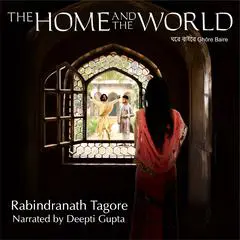 Play Audiobook Sample
Play Audiobook Sample
The Yogic Practice Of Sadhana Audiobook
 Play Audiobook Sample
Play Audiobook Sample
Quick Stats About this Audiobook
Total Audiobook Chapters:
Longest Chapter Length:
Shortest Chapter Length:
Average Chapter Length:
Audiobooks by this Author:
Publisher Description
Rabindranath Tagore was born May 7,1861. He was a Bengali poet, writer, composer, philosopher, social reformer and painter.[2] He reshaped Bengali literature and music, as well as Indian art with Contextual Modernism in the late 19th and early 20th centuries. Author of the "profoundly sensitive, fresh and beautiful verse" of Gitanjali, in 1913 he became the first non-European and lyricist to win the Nobel Prize in Literature. Tagore's poetic songs were viewed as spiritual and mercurial; however, his "elegant prose and magical poetry" remain largely unknown outside Bengal. He is sometimes referred to as "the Bard of Bengal". 'Darshan' is considered one of his iconic, seminal works. Produced by Mangal Maharaj Edited by Macc Kay Production executive Avalon Giuliano ICON Intern Eden Giuliano ©2021 Eden Garret Giuliano (P) 2021 Eden Garret Giuliano Jagannatha Dasa is the author of over thirty internationally bestselling biographies, including the London Sunday Times bestseller 'Blackbird: The Life and Times of Paul McCartney' and 'Dark Horse: The Private Life of George Harrison'. He can be heard on the Westwood One Radio Network and has written and produced over seven hundred original spoken-word albums and video documentaries on various aspects of popular culture. He is also a well-known movie actor. Jagannatha Dasa has been collecting and trading in elite rock memorabilia since 1968. Two coffee table books of his extensive world class collection have been published by Penguin Books.
Download and start listening now!
The Yogic Practice Of Sadhana Listener Reviews
Be the first to write a review about this audiobook!
About Rabindranath Tagore
Rabindranath Tagore (1861–1941) was a Bengali polymath who reshaped the art of his culture. His novels, stories, songs, dance-dramas, and essays spoke to topics political and personal. His verse, short stories, and novels were acclaimed—or panned—for their lyricism, colloquialism, naturalism, and unnatural contemplation. His compositions were chosen by two nations as national anthems: India’s “Jana Gana Mana” and Bangladesh’s “Amar Shonar Bangla.” Tagore was awarded the Nobel Prize in Literature in 1913 and knighted by the British Crown in 1915, though he later renounced this honor after the 1919 Amritsar massacre.








